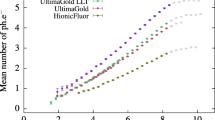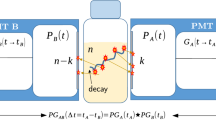Abstract
THE determination of all but the simplest radioactive decay schemes necessitates a means of analysis of the γ-rays emitted, so that coincidences may be measured between the various γ-rays, and also between a particular γ-ray and the primary β-ray spectrum. Many nuclei emit γ-rays well spaced in energy, and a spectrometer of quite poor resolution would separate them sufficiently well for coincidence measurements. It has been known for some time that organic crystal scintillation counters act proportionally for α-particles1. The present work shows that such a counter may also be used as a crude γ-ray spectrometer, with an extremely high efficiency.
This is a preview of subscription content, access via your institution
Access options
Subscribe to this journal
Receive 51 print issues and online access
$199.00 per year
only $3.90 per issue
Buy this article
- Purchase on Springer Link
- Instant access to full article PDF
Prices may be subject to local taxes which are calculated during checkout
Similar content being viewed by others
References
Harding, Flowers and Eppstein, Nature, 163, 990 (1949).
Metzger and Deutsch, Phys. Rev., 74, 1640 (1948).
Author information
Authors and Affiliations
Rights and permissions
About this article
Cite this article
CAVANAGH, P. Application of Proportional Scintillation γ-Ray Counters to the Determination of Radioactive Decay Schemes. Nature 165, 889–890 (1950). https://doi.org/10.1038/165889a0
Issue Date:
DOI: https://doi.org/10.1038/165889a0
This article is cited by
Comments
By submitting a comment you agree to abide by our Terms and Community Guidelines. If you find something abusive or that does not comply with our terms or guidelines please flag it as inappropriate.



